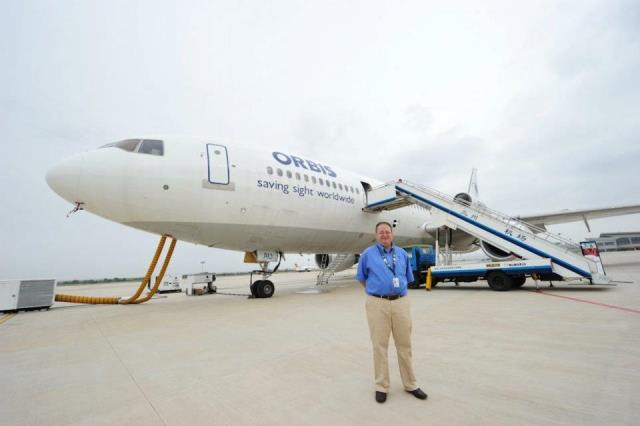
Dr. Carlos Solarte, Associate Clinical Professor, Department of Ophthalmology, University of Alberta currently volunteers worldwide with Orbis, training others in ophthalmology.
Dr. Solarte provided the following information in an interview conducted by Dr. Damji's summer student, Korey Kobylka, through the Heritage Youth Research Summer Program (HYRS) in August 2017:
"When I was doing my residency, which was over 20 years ago," he remarked, "One of my professors... was telling me there was a hospital built inside a plane [Orbis].This was the year 1995-1996. Realizing that three of his passions; aviation, travel and ophthalmology, could be combined in one place, he joined Orbis thus entering the world of the non-government organization, flying, blindness prevention."
Dr. Solarte explained, "Service is something that you do. Service is something anyone in the world can do, but if you train local people, it's way more effective and productive over the years. That's called capacity building. Orbis promotes capacity building in ophthalmology."
Dr. Solarte became a designer, implementer and evaluator of the Orbis projects. He indicated, "I started as what they call a "staff ophthalmologist" who is an ophthalmologist who meets with local people and [tries] to build and design ... teaching programs. I went on to become staff ophthalmologist, chief ophthalmologist, medical director, and finally to director of the plane. I travelled from 2001 - 2012 to 37 different countries serving in many capacities, including Volunteer Faculty".
After 2006 he stopped traveling so much and became a Pediatric Ophthalmologist, Researcher and Clinician. He said, "That's when I joined the volunteer side of Orbis, now I was part of the implementation." Dr. Solarte indicated, "It is nice when you go back to the same location several years after. You go, you teach something, and you hope that people there will learn. Then you leave but you really want to hope that what you did really expands."
Dr. Solarte provided an example. He directed a project in Kunming, China training in small incision cataract surgery; an inexpensive surgical technique treating large volumes of patients using few resources. The team arranged for a professor who was knowledgeable in the technique. The professor went to China and 20 procedures were performed." Dr. Solarte said, "the first 5 to 6 cases were done by him showing somebody working one to one ... with a Chinese doctor. The next five or six cases were done having half and the remainder of those were done by the Chinese doctor with the supervision of the doctor. When Dr. Solarte went back to China 4 months later, the 20 cases had multiplied to 600 and now the Chinese doctor taught the technique. Dr. Solarte summarized, "That is capacity building."

Examining a patient in Lanzhou (China)
Another example was in Ethiopia in 2003. "There were no working microscopes in public hospitals," Dr. Solarte stated, "So we had to introduce new era microscopes, and microscope use in ophthalmology. That was a significant change. We partnered with a non-government organization in the UK who provided them with equipment, and we provided them with the knowledge and the teaching of how to use the equipment. "When I came back to do the evaluation of that project a year later they were doing phaco cataract surgery, they were doing cornea transplants. Ethiopians are one of the group of people who are moving faster, catching up with the knowledge. Dramatically they change and15 years later … are on the level of any ophthalmologist in the world."
Dr. Solarte stated, "Orbis has a worldwide presence. It started with the plane in 1981, but now the plane is only a mere fraction [of the organization]. The plane continues to be the main icon but we still have so many projects that we can run in different places without the plane now and those are long term projects, because the plane is a short term. The plane is only 2 - 3 weeks but the other ones are months or even years. Like we have one in Trujillo (Peru )...where we are working with the government and the Regional Insitute of Ophthalmology (IRO. Orbis has been working with that project for maybe 15 or 20 years. Sending [professors and speakers - each 3 to 4 times a year, taking local doctors out of that project and [bringing] them to do fellowships in the USA or Canada. Orbis pays the bills. These people get trained and they go back ...and the place starts to grow and the population served."
Dr. Solarte remarked, "Orbis receives requests from governments, mostly from National associations of ophthalmology. Orbis doesn't want one individual to benefit from this. So what [are] the best people to partner with? The associations of the country. Orbis partners in Ethiopia with the Ethiopian Society of Ophthalmologist, with the college of physicians and surgeons.. That is why, [before committing] to do any training program, or spending significant amount of money, Orbis sends a team to do an evaluation. Applications are screened to determine which one is going to be the best benefit with the least risk of liability, least risk of somebody to profit from, [and] one that would not be dangerous for the staff."
Dr. Solarte summarized his dedication with these words, "I volunteer two weeks out of my year, every year; nonstop since 2006. This is my eleventh year doing this. Two weeks every year I've been in [countries including] Peru, Nigeria, Thailand, Indonesia, Malaysia, Cameroon, Ethiopia, and Uganda. I'm going to Cameroon at the first week of October again."
Surgery in Bacolod (Philippines)
